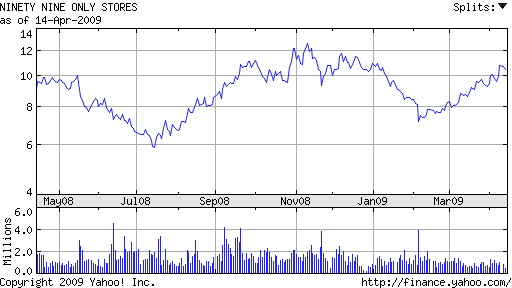Introduction
99-Cents-Only Stores are a famous consumer retail chain in the USA. Founded by David Gold in 1982, 99 cents deal in local brands general items such as house-wares, packed food, kitchen items, stationery, tools, utensils, toys, clothes, and pet care items, etc. the retail chain provides a huge platform of discounted goods that are seasonal and affordable. Apart from retail sales, 99 cents also sells wholesale goods to retailers, distributors, and exporters. 99-Cents are currently running more than 281 stores in Southern California and other states like Arizona, Nevada, and Texas Most of the stores are located in Southern California, where it started.
As the name suggests, the famous retail chain provides a deep discount on the general consumables such that all products are nearly priced at 99 Cents. The marketing idea created by the retail chain in 1982 has become massively popular in advertisement. One frequently comes across items priced at 99, 199 or 999, etc. The figure has a double effect on first-time readers. It tells one that it is less than 100, and the consumer considers it better than anything at 100 or 110. Over the years the deep-discount retail and wholesale industry have become highly competitive. The company faces tough competition in retailing, wholesale, local brands market, and imported goods market. It also offers its brand goods for sale.
Financial Status

The 99-cents market strategy has been a massive success. 99 cents now has on average annual sales of over $1.2 billion. 99 Cents is listed as NDN in S&P 400 and S&P 1500 Super Comp, and NYSE. The chart shows the share-price trend:
The net income for 99cnets has dramatically decreased over the last 3 years. Although the sales revenues are reported to have increased, general and sale expenses due to rising inflation have caused the income to decrease.
All numbers in thousands. Source: Company’s Financial Statements
The retail chain has currently 11,700 employees. The table shows the names and salaries of top officials.
99 Cents manages its shipping and trucking system for inventory transportation and management.
Competitors
99 Cents currently competes with giants like Wal Mart, BIG, Best Buy, and Arden Group. But the most similar and nearest market share competitor of 99c is Family Dollar Stores Inc. Family Dollar Stores’ market cap is currently $4.6 b, as compared to 99 cents’ $783m. They have 6,500 stores in 44 states, 25,000 employees, and a much wider range of products than 99 cents. Sales are very high ($6,983b in 2008) as compared to 99c. 99 cents is facing tough competition in many states in front of Family Dollar stores and others like Family Tree. Amid high inflation and tough competition, 99 cents were forced to raise prices on some items, for the first time, to 99.99cents.